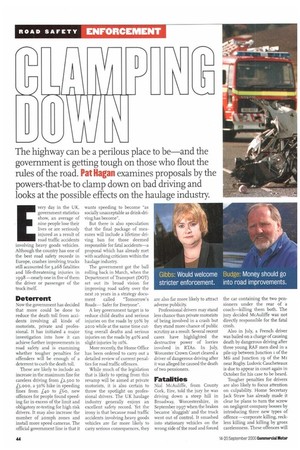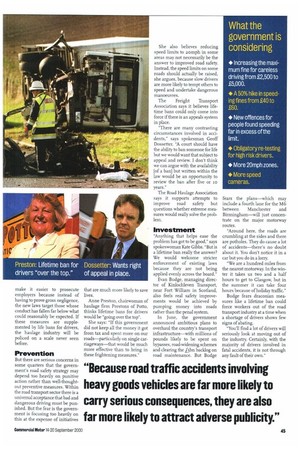The highway can be a perilous place to be—and the
Page 46

Page 47

If you've noticed an error in this article please click here to report it so we can fix it.
government is getting tough on those who flout the rules of the road. Pat Hagan examines proposals by the powers-that-be to clamp down on bad driving and looks at the possible effects on the haulage industry.
very day in the UK, government statistics show, an average of nine people lose their lives or are seriously injured as a result of road traffic accidents involving heavy goods vehicles. Although the country has one of the best road safety records in Europe, crashes involving trucks still accounted for 3,268 fatalities and life-threatening injuries in 1998 —nearly one in five of them the driver or passenger of the truck itself.
Deterrent
Now the government has decided that more could be done to reduce the death toll from accidents involving all kinds of motorists, private and professional. It has initiated a major investigation into how it can achieve further improvements in road safety and is examining whether tougher penalties for offenders will be enough of a deterrent to curb the death toll.
These are likely to include an increase in the maximum fine for careless driving from 12,500 to /5,000, a 50% hike in speeding fines from 140 to 16o, new offences for people found speeding far in excess of the limit and obligatory re-testing for high risk drivers. It may also increase the number of zomph zones and install more speed cameras. The official government line is that it
wants speeding to become "as socially unacceptable as drink-driving has become".
But there is also speculation that the final package of measures will include a lifetime driving ban for those deemed responsible for fatal accidents—a proposal which has already met with scathing criticism within the haulage industry.
The government got the ball rolling back in March, when the Department of Transport (DOT) set out its broad vision for improving road safety over the next to years in a strategy document called "Tomorrow's Roads— Safer for Everyone".
A key government target is to reduce child deaths and serious injuries on the roads by 5o% by 20 10 while at the same time cutting overall deaths and serious injuries on the roads by 40% and slight injuries by to%.
More recently, the Home Office has been ordered to carry out a detailed review of current penalties for road traffic offences.
While much of the legislation that is likely to spring from this revamp will be aimed at private motorists, it is also certain to throw the spotlight on professional drivers. The UK haulage industry generally enjoys an excellent safety record. Yet the irony is that because road traffic accidents involving heavy goods vehicles are far more likely to carry serious consequences, they
are also far more likely to attract adverse publicity.
Professional drivers may stand less chance than private motorists of being involved in a crash but they stand more chance of public scrutiny as a result. Several recent cases have highlighted the destructive power of lorries involved in RTAs. In July, Worcester Crown Court cleared a driver of dangerous driving after it was alleged he caused the death of two pensioners.
Fatalities
Nial McAuliffe, from County Cork, Eire, told the jury he was driving down a steep hill in Broadway, Worcestershire, in September '997 when the brakes became 'sluggish' and the truck went out of control. It smashed into stationary vehicles on the wrong side of the road and forced the car containing the two pensioners under the rear of a coach—killing them both. The jury decided McAuliffe was not directly responsible for the fatal crash.
Also in July, a French driver was bailed on a charge of causing death by dangerous driving after three young RAF men died in a pile-up between Junction I of the M6 and Junction 19 of the Mt near Rugby. Ludovic Caucheteaux is due to appear in court again in October for his case to be heard.
Tougher penalties for drivers are also likely to focus attention on culpability. Home Secretary Jack Straw has already made it clear he plans to turn the screw on negligent company bosses by introducing three new types of offence —corporate killing, reckless killing and killing by gross carelessness. These offences will make it easier to prosecute employers because instead of having to prove gross negligence, the new laws target those whose conduct has fallen far below what could reasonably be expected. If these measures are supplemented by life bans for drivers, the haulage industry will be policed on a scale never seen before.
Prevention
But there are serious concerns in some quarters that the government's road safety strategy may depend too heavily on punitive action rather than well-thoughtout preventive measures. Within the road transport sector there is a universal acceptance that bad and dangerous driving must be punished. But the fear is the government is focusing too heavily on this at the expense of initiatives that are much more likely to save lives.
Anne Preston, chairwoman of haulage firm Prestons of Potto, thinks lifetime bans for drivers would be "going over the top".
She says: If this government did not keep all the money it got from tax and spent more on our roads—particularly on single carriageways—that would be much more effective than to bring in these frightening measures." She also believes reducing speed limits to 20mph in some areas may not necessarily be the answer to improved road safety. Instead, the speed limits on some roads should actually be raised, she argues, because slow drivers are more likely to tempt others to speed and undertake dangerous manoeuvres.
The Freight Transport Association says it believes lifetime bans could only come into force if there is an appeals system in place.
"There are many contrasting circumstances involved in accidents," says spokesman Geoff Dossetter. "A court should have the ability to ban someone for life but we would want that subject to appeal and review. I don't think we can argue with the availability [of a ban] but written within the law would be an opportunity to review the ban after five or jo years."
The Road Haulage Association says it supports attempts to improve road safety but questions whether extreme measures would really solve the problem.
Investment
"Anything that helps ease the problem has got to be good," says spokeswoman Kate Gibbs. "But is a lifetime ban really the answer? We would welcome stricter enforcement of existing laws because they are not being applied evenly across the board."
Evan Budge, managing director of Kinlochleven Transport, near Fort William in Scotland, also feels real safety improvements would be achieved by pumping money into roads rather than the penal system.
In June, the government announced ambitious plans to overhaul the country's transport infrastructure—with millions of pounds likely to be spent on bypasses, road-widening schemes and clearing the L5bn backlog on road maintenance. But Budge fears the plans—which may include a fourth lane for the MG between Manchester and Birmingham—will just concentrate on the major motorway routes.
"Around here, the roads are crumbling at the sides and there are potholes. They do cause a lot of accidents—there's no doubt about it. You don't notice it in a car but you do in a lorry.
"We are a hundred miles from the nearest motorway. In the winter it takes us two and a half hours to get to Glasgow, but in the summer it can take four hours because of holiday traffic."
Budge fears draconian measures like a lifetime ban could force workers out of the road transport industry at a time when a shortage of drivers shows few signs of abating.
"You'll find a lot of drivers will seriously look at moving out of the industry. Certainly, with the majority of drivers involved in fatal accidents, it is not through any fault of their own."








































































































